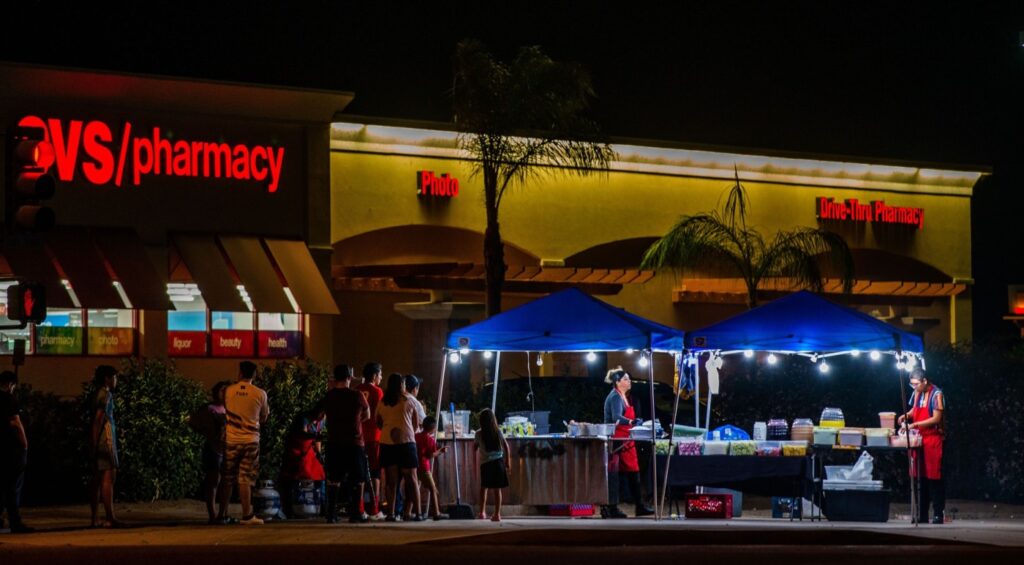
Street vendors are huge economic engines that enhance California’s local economies and neighborhoods. But they face a vicious, unending cycle of poverty and criminalization due to outdated policies that deny them access to food vending permits. In response, an expert panel of street vendors and advocates have helped craft Senate Bill 972, a bill that I have introduced in the state legislature.
This bill would protect the vendor community by creating a more equitable and inclusive food economy. SB 972, a bill created by and for the vendor community, is driven and supported by the people most impacted by a system that fails so many of us—people like Merlin Alvarado.
For the past 16 years, Alvarado has sold fruit and hot dogs in Hollywood. After leaving a factory job ridden with exploitative working conditions, vending provided her a welcomed opportunity to have agency and control over her circumstances. An immigrant from Honduras, she has worked tirelessly to support her three children—all the while providing affordable food to our community.
Many vendors come from low-income communities of color—those who have been historically denied equitable access to resources such as quality affordable housing, higher education, and fair-paying jobs. People turn to vending because it provides them with economic opportunities that are so often limited, whether it’s because of older age, immigration status, or language barriers. Many of these micro-entrepreneurs are women of color and heads of households; vending allows them a flexible schedule to work while caring for their families.
Street vendors like Alvarado reflect the rich cultural diversity of our state and the vital role that small businesses play in our local economies. In Los Angeles alone, street vendors make an average annual income of $15,000 but generate over $500 million dollars in revenue for the city each year.
But the policies that currently dictate the landscape for how street vendors can do business are leaving hardworking people like Alvarado out to dry—and even worse, subjecting them to increased harassment, criminalization, and deportation that can cost families their livelihood.
Many of the vendors I’ve spoken with have expressed their desire to do their job without fear of being arrested, without fear of seeing the fruits of their labor dumped into garbage cans.
Last year, over 130 street vendors at the Guatemalan Night Market in Westlake, Avenue 26 Night Market in Lincoln Heights, and Patata Street in Cudahy, located within my District, were shut down without notice. This past May, more than 50 vendors from the culinary and cultural hub known as El Salvador Corridor street food market in the city of Los Angeles were displaced.
Despite the statewide legalization and decriminalization of street vending in 2018, the current California Retail Food Code makes it impossible for vendors to do their job legally and actually harms them. While the state’s retail food code is considered the blueprint for rigorous health and safety requirements in the food sector, it is not right-sized for the activity of vending, and furthermore, does not outline any standardized process for how local jurisdictions enforce the code across the state, leaving vendors subject to selective interpretation. This has led local health departments and law enforcement to show up unannounced with multiple citations, thousands of dollars in fines, and violent sweeps—often all in one day.
The outdated retail food code, which is primarily written for restaurants, creates unnecessary challenges in a sector already ridden with barriers for street vendors to be integrated into the formal food economy. Obtaining the permits and equipment necessary to legally operate has been unreasonably expensive and nearly impossible for many.
Empowered to take action, Cesar Benitez of Gourmet Aguas Frescas, joined fellow street vendors to share their experience and advocate on behalf of SB 972, “Someone like me doesn’t have the means to pay thousands of dollars to rent a commissary space. The money I earn selling my aguas frescas is barely enough to cover my living expenses.”
It is time we update the California Retail Food Code by passing SB 972.
Related Articles
Endorsement: Rob Bonta for California Attorney General
Zoning is ruining Southern California cities
Vin Scully’s passing leaves us speechless
Putting local governments on notice about taxation
Why are there so few homeless people in Western Europe?
SB 972 creates opportunities for vendors—and our local economies—to thrive. Vendors would be able to prepare food outside of expensive and difficult to access commissaries, and in approved kitchens at home. It would allow for an easier permitting process and ensure our street vendors can legally participate in the food economy.
And finally, SB 972 would help end the immense harassment and vicious cycle of debt from compliance standards that the current retail food code forces many vendors into.
With continued support from our communities and my colleagues in the legislature, SB 972 will continue through the legislative process before reaching the Governor’s desk to be signed into law in the fall.
Removing obstacles for street vendors is not only the right thing to do, but a commonsense way to bring legitimacy and opportunity to all small businesses. To ensure that California’s economy and local neighborhoods can flourish, it is imperative that my fellow lawmakers support micro-entrepreneurship and condemn discrimination in all its forms. I urge my legislative colleagues to stand with vendors in supporting SB 972.
Lena A. Gonzalez is a California state senator representing the 33rd District which includes Los Angeles County cities and communities of Cudahy, Bell, Bell Gardens, Lynwood, Maywood, Signal Hill, Paramount, South Gate, Vernon, Walnut Park, Huntington Park, and most of Long Beach.
